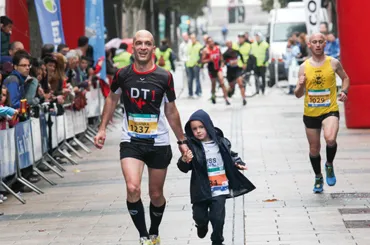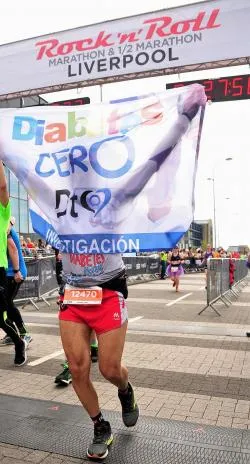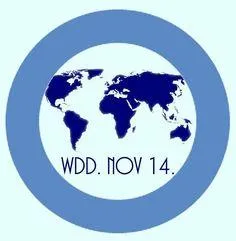When I debuted on January 1, 2014 at the age of 38, I took that of "New Year New New" too seriously.The first reaction of both mine and my family was in amazement and disbelief.The second, I suppose it was angry.
I remember that the first night in the hospital was quite hard and gave many laps to the coconut.I did nothing but think how I was going to affect my daily life, it was an unknown at that time!
However, I have a nephew who has been diabetic for more than 10 years and that made him already have a certain knowledge about the disease and about the daily routines of a person with diabetes.
Juanra Ortega and his eldest son in the goal of the Half Marathon of Vitoria
On the other hand, a few years ago I was in the presentation of a video of a diabetic climber in Donosti, Mikel Vera, in which it showed how many taboos had broken when practicing a risk sport such as climbing and also doing it at a very high level.
In my mountaineer I met Rubén, another very high level climber that I also had to deal with diabetes.In addition, coincidences of life, just a month ago that he had read a chronicle in a forum in which Álvaro, a Vitorian diabetic, told how he had gone to Amsterdam's marathon to go down from 3 hours.
Those examples were the ones that kept me afloat that first night.That the doctor tells you that you will be able to make "normal life", it sounds a bit to words to raise your mood that at that first time it is hard to believe them, however the chronicle of the Amsterdam marathon was something real, that didcredibility!.So, after the initial shock, on the second day I was already thinking that if, despite diabetes, they had managed to get to where they have proposed to arrive, it is really possible to make normal life again and consider new challenges.The only problem was to know how.
A passionate about athletics
I love sport, especially athletics.In fact, the debut caught me beginning to prepare the Vitoria marathon.At that time I went to run between 5 and 6 days a week, and my first doubts were precisely in knowing how diabetes would affect me.From the first moment my endocrine told me that I could run again, which was very rewarding and hopeful.Not only that but he told me that it was highly advisable to run every day and that he would help me have controlled diabetes.Of course, one thing is to be able to jog and a very different one to be able to train strong.He told me that he would have to be patient since it would spend a lot of time until he did it intensely as until that time, first we had to learn to control glucose levels.
Then I have realized that the way of seeing the sport-diabetes relationship has changed a lot in recent times since it does not do so many years that when someone debuted as a diabetic they recommended not making great efforts or risk sports.Now, at least in my case, it was never a "you will not be" but "if you manage to keep the controlled glucose can be possible."And that is appreciated.
The limitations came a bit in the form of deadlines and intensity of the exercise.What for me a quiet trot of a horita was a very affordable training and without too much effort, for the endocrine was "a very demanding training."As for the deadlines, more or less it was suggested that it could jog back again in spring.Which I have to say that at that time I annoyed me but I took it as a minor evil, as a 3 or 4 months injury.
Diabetes, a challenge more than a problem
I set out to learn everything possible about diabetes to return to my normal life as soon as possible.I assumed it more as a challenge than as a problem.After the diagnosis had a very needBig of checking for myself that it was possible to make a normal life and from the first moment I was clear that the day I could train again would be the confirmation that I had achieved it.That is, if I could bring my body again to its physical limit without diabetes being an impediment that implied that the rest of the time in my day to day would also be under control.
the sport, my great ally
Of a few things in this life I am as sure as that the practice of physical exercise has been a total success.Not only does it help me to have better controlled diabetes but at the mood and mental level it is also very important.
The glycosilada has dropped a lot, I debuted with a value of 11.4 in January and at the end of March of that same year it had already dropped to 6.4.A 5 -point downturn in 3 months.At the end of the year I already had values below 6 and in this year 2015 they are still below with hardly any hypoglycemia, something very important.When sports every day the dose of basal insulin that I get down a lot and that, along with adequate diet, collaborates in being able to maintain low glucose levels (around 90 - 100) without hypoglycemia.
Undoubtedly, sport is essential to achieve this control since it decreases blood glucose levels, increases insulin sensitivity and allows you whims in feeding that makes it mentally not to suppose so much inconsistent, since you don't have to beso strict with the diet.
In short, I encourage all those who with diabetes wantThey have proposed.With patience but without stopping.You have to learn to adapt diabetes to sport and not vice versa.There are no more secrets.
Fighters team
I currently be part of two teams of athletes with diabetes: the DT1 Team ( Link and the Teamone ( Link me it has been vital to be part of these teams because you take advantage of the experience of other athletes who have been dealing with diabetes for years and that allows you to draw conclusions and solve problems very quickly.It is a group of people who when you are low of moral puts the batteries to lift your spirits and move on, but that when you are euphoric it also puts your feet on the ground and reminds you that you do not lower your guard, that diabetes isA daily fight and that if you do it is on the prowl and do not forgive.






